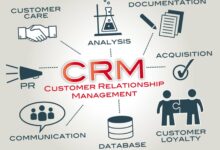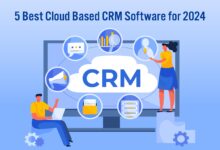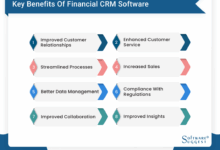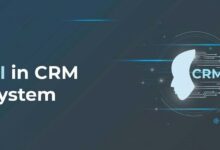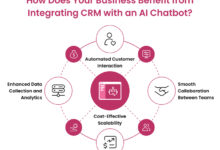CRM Software For Small Business: Streamlining Operations And Boosting Sales
CRM Software for Small Business sets the stage for this enthralling narrative, offering readers a glimpse into a story that is rich in detail with casual formal language style and brimming with originality from the outset.
CRM software plays a crucial role in helping small businesses manage customer relationships effectively, streamline operations, and ultimately drive growth and success. This guide dives deep into the world of CRM software tailored for small businesses, exploring its benefits, types, factors to consider, implementation process, and much more.
Introduction to CRM Software for Small Business
Customer Relationship Management (CRM) software is a tool that helps small businesses manage interactions with customers and potential customers. It is essential for small businesses as it enables them to centralize customer data, track customer interactions, and improve customer relationships.
Key Features of CRM Software for Small Business
- Centralized Customer Database: CRM software allows small businesses to store and access customer information in one place, making it easier to track customer interactions and preferences.
- Contact Management: Small businesses can efficiently manage customer contacts, including lead details, communication history, and follow-up tasks.
- Sales Automation: CRM software helps streamline the sales process by automating tasks such as lead scoring, email campaigns, and sales forecasting.
- Reporting and Analytics: Small businesses can generate reports and analyze data to track sales performance, customer engagement, and marketing effectiveness.
Popular CRM Software Options for Small Businesses
- HubSpot CRM: Offers a free version with essential CRM features and seamless integration with marketing automation tools.
- Zoho CRM: Provides customizable modules, workflow automation, and social media integration for small businesses.
- Salesforce Essentials: Tailored for small businesses, offering contact management, sales automation, and customer support features.
Implementing CRM Software in a Small Business Setting
When implementing CRM software in a small business, it is crucial to:
- Define your business objectives and customer data requirements.
- Select a CRM software that aligns with your business needs and budget.
- Train employees on how to use the CRM software effectively.
- Integrate CRM software with other tools like marketing automation or help desk software for a seamless workflow.
Benefits of Integrating CRM Software with Other Tools
Integrating CRM software with other tools like marketing automation or help desk software can:
Improve customer engagement, enhance marketing campaigns, and streamline customer support processes.
Benefits of Using CRM Software for Small Business
Implementing CRM software can bring numerous advantages to small businesses, ranging from improving customer relationships to enhancing marketing efforts.
Improved Customer Relationships
- CRM software allows businesses to track customer interactions, preferences, and history, leading to personalized communication and better customer service.
- By having all customer data in one place, businesses can provide timely responses and anticipate customer needs, fostering loyalty and satisfaction.
- Examples of CRM software improving customer relationships include sending personalized emails, targeted promotions, and reminders for follow-ups.
Increase in Sales
- By analyzing customer data, businesses can identify upselling and cross-selling opportunities, leading to increased sales and revenue.
- CRM software helps in identifying leads, tracking sales pipelines, and nurturing prospects, resulting in a higher conversion rate.
- Examples of CRM software increasing sales include automated follow-ups, lead scoring, and forecasting sales trends.
Enhanced Marketing Efforts
- CRM software enables targeted marketing campaigns based on customer segmentation, preferences, and behavior, resulting in higher engagement and ROI.
- Businesses can track marketing campaign performance, analyze customer responses, and optimize strategies for better results.
- Examples of CRM software enhancing marketing efforts include personalized marketing messages, automated workflows, and lead nurturing campaigns.
Setting up and Customizing CRM Software
- Businesses can customize CRM software according to their specific needs, such as adding custom fields, workflows, and reports.
- Setting up CRM software involves importing existing customer data, defining user roles, and configuring automation rules for efficient operations.
- Tips for training employees to effectively use CRM software include providing hands-on training, creating user guides, and offering ongoing support and feedback.
Types of CRM Software and Features
- There are various types of CRM software available, including cloud-based, on-premise, and hybrid solutions, each offering different features and functionalities.
- Common features of CRM software include contact management, lead tracking, sales forecasting, email integration, and reporting tools.
- Businesses can choose CRM software based on their budget, scalability, integration capabilities, and industry-specific requirements.
Data Security and Privacy
- Ensuring data security and privacy is crucial when using CRM software, as it involves storing sensitive customer information.
- Businesses should implement security measures such as encryption, access controls, regular backups, and compliance with data protection regulations.
- Examples of data security measures in CRM software include role-based permissions, audit trails, and data encryption for secure storage and transmission.
Types of CRM Software Suitable for Small Business
When it comes to choosing CRM software for a small business, there are several types available in the market. Each type offers different features and functionalities to cater to the specific needs of small businesses. Let’s compare and contrast some of the popular CRM software options suitable for small businesses.
Cloud-Based CRM Software
Cloud-based CRM software is a popular choice for small businesses due to its flexibility and accessibility. It allows businesses to access customer data and manage relationships from anywhere with an internet connection. Some popular cloud-based CRM software options include Salesforce, HubSpot CRM, and Zoho CRM. These platforms offer a range of features such as contact management, lead tracking, and sales automation, making them ideal for small businesses looking to streamline their customer management processes.
Scalability of CRM Software Solutions
One of the key factors to consider when choosing CRM software for a small business is scalability. As businesses grow, their customer management needs also evolve. It’s essential to choose a CRM software solution that can grow with your business and adapt to changing requirements. Cloud-based CRM software is known for its scalability, allowing businesses to easily add more users, features, and functionalities as needed without significant upfront costs or IT resources.
Factors to Consider When Choosing CRM Software for Small Business
When selecting CRM software for a small business, there are several key factors that should be taken into consideration to ensure the right fit for the organization’s needs.
Customization and Integration Capabilities
One important factor to consider is the customization and integration capabilities of the CRM software. Small businesses often have unique processes and requirements, so the ability to customize the software to fit their specific needs is crucial. Additionally, seamless integration with other tools and systems used by the business can enhance efficiency and productivity.
Cost and Scalability
Cost is another significant factor when choosing CRM software for a small business. It’s essential to consider not only the initial cost of the software but also any recurring fees, training costs, and potential customization expenses. Scalability is also important, as the chosen CRM software should be able to grow with the business and accommodate increasing data and users without significant disruptions.
Implementation of CRM Software in Small Business
Implementing CRM software in a small business can be a game-changer, but it requires careful planning and execution to ensure a smooth transition. Here is a step-by-step guide on how small businesses can effectively implement CRM software:
Step 1: Define Your Objectives
- Identify the key goals you want to achieve with CRM software.
- Determine what specific problems you want the CRM software to solve.
Step 2: Choose the Right CRM Software
- Research and select a CRM software that aligns with your business needs and budget.
- Consider factors such as scalability, ease of use, and integration capabilities.
Step 3: Customize and Configure the CRM Software
- Tailor the CRM software to match your unique business processes and workflows.
- Set up user permissions and access levels based on roles within your organization.
Step 4: Data Migration and Integration
- Transfer existing customer data into the CRM system without losing any crucial information.
- Integrate the CRM software with other tools and applications used in your business for seamless data flow.
Step 5: Training and Onboarding
- Provide comprehensive training to employees on how to use the CRM software effectively.
- Offer ongoing support and resources to ensure a smooth transition and adoption of the new system.
Challenges and Solutions
Small businesses may face challenges such as resistance to change, lack of technical expertise, and data quality issues during CRM software implementation. To overcome these challenges:
Communicate the benefits of CRM software to employees, invest in training programs, and regularly audit and clean up data to ensure accuracy.
Best Practices for Training Employees
- Provide hands-on training sessions with real-life scenarios to help employees understand the practical application of CRM software.
- Assign a dedicated team or individual to serve as a point of contact for any questions or issues related to the CRM software.
Integrating CRM Software with Other Business Systems
Integrating CRM software with other business systems can significantly enhance the efficiency and effectiveness of operations in a small business. By seamlessly connecting different platforms, businesses can streamline processes, improve data accuracy, and provide a more personalized experience for customers.
Examples of Common Integrations
- Integration with Email Marketing Platforms: By integrating CRM software with email marketing platforms, businesses can easily track customer interactions, create targeted email campaigns, and measure the effectiveness of their marketing efforts.
- Integration with Accounting Software: Connecting CRM software with accounting software enables businesses to have a comprehensive view of customer transactions, outstanding payments, and financial history, leading to better financial management and forecasting.
- Integration with E-commerce Platforms: Integrating CRM software with e-commerce platforms allows businesses to track customer purchases, preferences, and behavior, enabling them to provide personalized recommendations, promotions, and support.
Challenges and Solutions
One of the main challenges of integrating CRM software with existing business systems is ensuring compatibility and data consistency across platforms. This can be overcome by investing in a robust integration solution that can sync data in real-time, perform regular data validation checks, and provide seamless data migration processes.
It is crucial to involve IT professionals or consultants during the integration process to ensure a smooth transition and minimize disruptions to daily operations.
Additionally, businesses should prioritize data security and compliance with data protection regulations when integrating CRM software with other systems. Implementing encryption protocols, access controls, and regular security audits can help mitigate risks and safeguard sensitive customer information.
Data Management and Security in CRM Software for Small Business
When it comes to using CRM software in a small business, data management and security are crucial aspects that cannot be overlooked. Ensuring that customer data is accurately entered, securely stored, and well-maintained is essential for the success and reputation of the business.
Best Practices for Data Entry, Storage, and Maintenance
- Utilize standardized data entry formats to maintain consistency and accuracy.
- Regularly clean and update data to ensure relevance and reliability.
- Implement data backup procedures to prevent loss in case of system failures.
Ensuring Data Security and Compliance
- Use secure passwords and encryption methods to protect sensitive customer information.
- Regularly update CRM software to patch vulnerabilities and enhance security features.
- Train employees on data security protocols and compliance regulations to prevent data breaches.
Common Data Security Threats for Small Businesses
- Phishing attacks targeting employees to gain access to CRM data.
- Ransomware attacks that can encrypt or delete data, demanding payment for recovery.
- Unauthorized access to CRM software by former employees or external hackers.
Steps for Data Backup and Recovery
- Set up automatic backups on a regular basis to ensure data redundancy.
- Store backup data in secure offsite locations to prevent loss in case of physical damage.
- Implement disaster recovery plans to quickly restore data in case of cyber attacks or system failures.
Encryption Methods for Customer Data Security
- Utilize strong encryption algorithms like AES (Advanced Encryption Standard) to protect sensitive data.
- Implement SSL (Secure Sockets Layer) encryption for secure data transmission between CRM software and servers.
Setting Access Controls and User Permissions
- Define user roles and permissions based on job responsibilities and data access needs.
- Restrict access to sensitive customer data to authorized personnel only.
- Regularly review and update user permissions to maintain data integrity and security.
Customization and Personalization Features in CRM Software
Customization and personalization features in CRM software for small businesses play a crucial role in tailoring the software to meet specific needs and requirements. These features allow businesses to adapt the CRM system to their unique workflows and processes, ultimately enhancing user experience and efficiency.
Adapting Fields and Layouts
- Small businesses can customize CRM software by adapting fields and layouts to match their specific data requirements. This allows them to capture relevant information and streamline data entry processes.
- By rearranging fields and layouts based on their preferences, businesses can create a more intuitive user interface that matches their workflow, leading to increased productivity.
- For example, a small retail business can customize their CRM software to include fields for tracking customer preferences, purchase history, and loyalty program participation, providing a personalized experience for each customer.
Automating Workflows
- CRM software offers customization options for automating workflows, such as setting up automated email responses, task assignments, and follow-up reminders. This helps small businesses streamline their processes and improve communication with customers.
- By personalizing automated workflows, businesses can ensure that each customer interaction is timely, relevant, and tailored to individual preferences, leading to higher customer satisfaction and retention.
- For instance, a small service-based business can customize their CRM software to automatically schedule follow-up appointments, send service reminders, and track customer feedback, enhancing the overall customer experience.
Creating Custom Reports
- CRM software allows small businesses to create custom reports that align with their specific key performance indicators (KPIs) and business goals. This customization feature enables businesses to track and analyze data that is most relevant to their operations.
- By generating personalized reports, businesses can gain valuable insights into customer behavior, sales trends, and marketing campaign performance, empowering them to make data-driven decisions and optimize their strategies.
- For example, a small marketing agency can customize their CRM software to generate reports on lead conversion rates, email campaign engagement, and customer segmentation, helping them refine their marketing tactics for better results.
Reporting and Analytics Capabilities of CRM Software
Reporting and analytics capabilities are essential components of CRM software for small businesses as they provide valuable insights into customer behavior, sales performance, and overall business operations. By leveraging these capabilities, businesses can make informed decisions, identify trends, and optimize their strategies for growth.
Key Metrics and Reports for Small Businesses
- Customer Acquisition Cost (CAC) and Customer Lifetime Value (CLV) tracking
- Sales Pipeline and Forecasting reports
- Customer Segmentation and Behavioral Analysis
- Lead Conversion Rates and Sales Performance Metrics
Setting Up Custom Reports
Small businesses can tailor reports in CRM software to their specific needs by selecting relevant data fields, filters, and visualization options. This customization allows for a more focused analysis of key performance indicators and business metrics.
Role of Data Visualization Tools
Data visualization tools within CRM software help in presenting complex data in a visually appealing and easy-to-understand format. Charts, graphs, and dashboards enhance the interpretation of analytics, enabling users to quickly grasp insights and trends.
Interpreting CRM Analytics for Business Growth
Interpreting CRM analytics involves analyzing trends, patterns, and opportunities within the data to make strategic decisions. By identifying customer preferences, sales patterns, and market trends, businesses can optimize their marketing efforts, improve customer relationships, and drive growth.
Standard Reports vs. Advanced Analytics Features
While standard CRM reports offer basic insights into sales and customer data, advanced analytics features provide deeper analysis, predictive modeling, and machine learning capabilities. Small businesses can benefit from advanced analytics by gaining a more comprehensive understanding of their operations and customer interactions.
Mobile Accessibility and Remote Work Features in CRM Software
Mobile accessibility and remote work features are crucial components of CRM software for small businesses in today’s digital age. These features enable businesses to stay connected, efficient, and productive, even when working remotely or on the go. By utilizing CRM software with mobile accessibility and remote work capabilities, small businesses can streamline their operations, enhance communication, and provide excellent customer service regardless of their physical location.
Benefits of Mobile Accessibility and Remote Work Features
- Access Anytime, Anywhere: With mobile accessibility, sales and customer service teams can access important customer data, communication history, and tasks on their smartphones or tablets, allowing them to respond to queries and resolve issues promptly, even when away from the office.
- Real-Time Updates: Remote work features in CRM software enable employees to update customer information, track sales progress, and collaborate with team members in real-time, ensuring that everyone is on the same page and working efficiently.
- Increased Productivity: Mobile accessibility empowers employees to complete tasks, schedule appointments, and follow up with leads while on the move, eliminating delays and improving overall productivity for small businesses.
- Enhanced Customer Experience: By having access to customer data and interactions at their fingertips, sales and customer service teams can provide personalized and timely responses, leading to improved customer satisfaction and loyalty.
Customer Support and Training Options for Small Businesses Using CRM Software
Customer support and training are crucial aspects for small businesses utilizing CRM software to ensure successful implementation and maximize its benefits.
Customer Support Options
- Small businesses can access customer support through various channels such as email, phone, live chat, and support tickets.
- It is important to consider the response times for each channel to address any issues or queries promptly.
Training Resources
- CRM software vendors offer training resources like video tutorials, webinars, and in-person training sessions to help small businesses understand and use the software effectively.
- Small businesses should take advantage of these resources to ensure their team is well-equipped to utilize the CRM software efficiently.
Maximizing Customer Support and Training Value
- Small businesses should actively engage with customer support and training resources provided by CRM software vendors to enhance their knowledge and skills.
- Scheduling regular training sessions and utilizing all available resources can help small businesses make the most out of their CRM software investment.
Setting Up Training Sessions
- Small businesses can set up training sessions with CRM software providers by contacting their customer support team or accessing the training portal on the software platform.
- Following a step-by-step guide provided by the vendor can help small businesses schedule and participate in training sessions effectively.
Comparison of Customer Support Features
| CRM Software Vendor | Customer Support Features | Training Options |
|---|---|---|
| Vendor A | 24/7 phone support, email ticketing system | Video tutorials, weekly webinars |
| Vendor B | Live chat support, dedicated account manager | In-person training sessions, on-demand training modules |
Case Studies of Small Businesses Successfully Using CRM Software
CRM software has proven to be a game-changer for many small businesses, enabling them to streamline their operations, improve customer relationships, and boost sales. Let’s explore some real-life examples of small businesses that have successfully implemented CRM software.
Case Study 1: Small Retail Store
- The small retail store implemented CRM software to track customer preferences and purchase history, allowing them to personalize marketing campaigns and promotions.
- By using CRM software, the store saw a 20% increase in customer retention and a 15% growth in sales within the first year of implementation.
- The key features that contributed to the success of the retail store included automated email campaigns, lead management, and sales forecasting.
Case Study 2: Consulting Firm
- A consulting firm integrated CRM software to manage client relationships and track project milestones, leading to improved communication and collaboration among team members.
- After implementing CRM software, the consulting firm reported a 30% increase in client satisfaction and a 25% reduction in project completion time.
- The customizable reporting and analytics capabilities of the CRM software played a crucial role in the firm’s success, providing valuable insights for strategic decision-making.
Case Study 3: Online Marketing Agency
- An online marketing agency adopted CRM software to streamline lead generation, client onboarding, and campaign management processes, resulting in increased efficiency and productivity.
- With CRM software in place, the agency achieved a 40% increase in lead conversion rates and a 20% decrease in customer acquisition costs.
- The mobile accessibility and remote work features of the CRM software allowed the agency’s team to collaborate effectively, even when working remotely.
Industry Trends and Future Outlook for CRM Software in Small Business
The adoption of CRM software in small businesses is influenced by various industry trends that shape the way businesses interact with customers. As technology continues to advance, the role of CRM software becomes increasingly crucial for businesses looking to streamline their operations and enhance customer relationships.
Impact of AI and Automation on CRM Software
AI and automation are revolutionizing the way CRM software functions within small businesses. By leveraging AI-powered tools, businesses can automate repetitive tasks, analyze customer data more efficiently, and personalize interactions at scale. This trend is expected to continue shaping the future of CRM software in small businesses, making operations more efficient and customer-centric.
- AI-driven insights provide businesses with valuable data to make informed decisions and anticipate customer needs.
- Automation streamlines processes, reducing manual data entry and improving overall productivity.
- Personalization capabilities enhance customer experiences, leading to increased loyalty and retention rates.
Role of Data Analytics and Personalization in CRM Strategies
Data analytics play a crucial role in helping small businesses understand customer behavior, preferences, and trends. By utilizing data-driven insights, businesses can tailor their CRM strategies to meet the specific needs of their customers, ultimately driving growth and profitability.
Data analytics allows businesses to segment customers effectively, target specific demographics, and measure the success of marketing campaigns.
Successful CRM Software Implementation in Small Businesses
Several small businesses have successfully implemented CRM software to improve their customer relationships and operational efficiency. Key factors contributing to their success include selecting the right software that aligns with their unique needs, providing comprehensive training to employees, and integrating CRM software seamlessly with other business systems.
- Choosing CRM software that offers scalability and customization options based on the business’s growth trajectory.
- Ensuring employees are well-trained on how to effectively use CRM software to maximize its benefits.
- Integrating CRM software with existing tools and systems to create a unified data ecosystem for better decision-making.
Challenges and Solutions in CRM Software Implementation
While implementing CRM software in small businesses, challenges such as data migration, resistance to change, and lack of technical expertise may arise. To overcome these obstacles, businesses can invest in proper training programs, seek support from CRM software providers, and gradually introduce changes to ensure a smooth transition.
Collaboration between IT teams, management, and end-users is essential to address challenges effectively and ensure successful CRM software implementation.
Training and Support for Employees During CRM Adoption
Providing adequate training and support for employees during the CRM adoption process is crucial for maximizing the benefits of the software. Small businesses should offer continuous learning opportunities, access to online resources, and responsive customer support to empower employees and drive successful CRM implementation.
Scalability of CRM Software Solutions for Small Businesses
As small businesses grow and expand, the scalability of CRM software solutions becomes paramount. Businesses should choose CRM software that can adapt to their changing needs, accommodate a growing customer base, and integrate seamlessly with additional tools and systems as the business evolves.
Tips for Maximizing ROI with CRM Software in Small Business
Implementing CRM software in a small business can significantly enhance customer relationships and boost overall efficiency. However, to maximize the return on investment (ROI) with CRM software, small businesses need to adopt specific strategies and best practices. Here are some practical tips for small businesses looking to get the most out of their CRM software:
Measuring Effectiveness and Optimization
- Regularly review key performance indicators (KPIs) to measure the effectiveness of CRM software in achieving business goals.
- Optimize data entry processes to ensure accurate and up-to-date information for better decision-making.
- Utilize CRM analytics tools to identify trends and patterns in customer behavior for targeted marketing strategies.
Setting Specific Goals
- Define clear and measurable objectives for CRM implementation, such as increasing sales conversion rates or improving customer retention.
- Track progress towards these goals and adjust strategies as needed to stay on course.
Automation Features and Personalization Strategies
- Take advantage of automation features in CRM software to streamline repetitive tasks and improve workflow efficiency.
- Use CRM data insights to create personalized communication strategies that resonate with individual customers.
Employee Training and Integration with Other Tools
- Provide regular training sessions for employees to enhance their understanding of CRM software functionalities and encourage adoption.
- Integrate CRM software with other business tools or platforms to create a seamless flow of information and improve overall business operations.
Conclusion: Key Takeaways for Small Businesses Considering CRM Software
After exploring the various aspects of CRM software for small businesses, it is clear that implementing such a system can bring numerous benefits and improvements to operations. It is essential for small businesses to consider their specific needs and evaluate the possibilities of adopting CRM software to enhance customer relationships and streamline processes.
Key Points and Benefits of Using CRM Software for Small Businesses
- Centralized customer data management for better insights and personalized interactions.
- Improved efficiency and productivity through automation of tasks and workflows.
- Enhanced customer relationships and satisfaction with timely and targeted communications.
- Increased sales and revenue through better lead management and sales pipeline tracking.
- Access to valuable reporting and analytics for informed decision-making and strategy development.
Call to Action
Small businesses interested in harnessing the power of CRM software are encouraged to take the next step towards evaluating their needs and exploring suitable options in the market. By adopting CRM software, businesses can unlock opportunities for growth, efficiency, and customer satisfaction.
Summary
In conclusion, CRM Software for Small Business is not just a tool but a strategic asset that can transform how small businesses operate and connect with their customers. By harnessing the power of CRM software, small businesses can unlock new opportunities, enhance customer relationships, and propel their growth in today’s competitive market.
